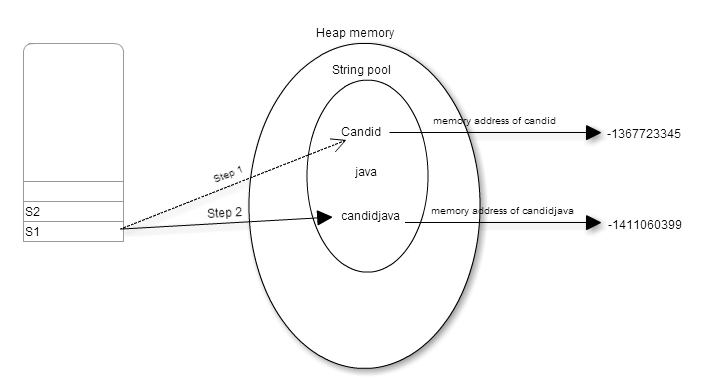Why Are Strings Immutable in Java? Understanding the Core Concepts
Why Are Strings Immutable in Java? Understanding the Core Concepts
Blog Article
What Is Unalterable Strings and Just How It Functions
In the world of programming, recognizing the concept of immutable strings is extremely important for developing secure and durable applications. Immutable strings describe strings that can not be modified after they are produced, making sure data integrity and predictability within the code. This essential principle plays a critical role in various shows languages and uses a distinct strategy to dealing with information. By checking out the complexities of exactly how immutable strings work, one can reveal a world of benefits and opportunities that can elevate the quality and effectiveness of software growth.
The Fundamentals of Unalterable Strings
Immutable strings, as an essential idea in shows, are personality sequences that can not be altered when they are produced. This means that when a string is designated a value, that value can not be changed. In languages like Python and Java, strings are unalterable objects, bring about different ramifications in terms of memory monitoring and data honesty.
Among the key advantages of immutable strings is that they offer a feeling of safety and security in information control. Considering that the material of an unalterable string can not be changed, it guarantees that the initial data remains intact, decreasing the threat of unintentional modifications during program execution (Why are strings immutable in Java?). This building additionally streamlines debugging processes, as programmers can rely on that once a string is defined, its worth will not be accidentally changed
Moreover, immutable strings assist in efficient memory usage. When a brand-new string is created based on an existing one, as opposed to changing the original string, the brand-new worth is saved separately. This technique improves efficiency by minimizing memory fragmentation and simplifying memory allocation processes. Overall, comprehending the basics of unalterable strings is crucial for mastering shows concepts and optimizing code effectiveness.
Advantages of Immutable Strings
Building upon the safety and security and efficiency benefits of unalterable strings, their benefits encompass improving code reliability and simplifying simultaneous programming tasks. By being unalterable, strings can not be customized after production, which gets rid of the risk of unexpected changes in the information they save. This integral immutability guarantees that as soon as a string is created, its worth remains consistent throughout the program's execution, lowering the chances of bugs brought on by unanticipated alterations.
Additionally, unalterable strings contribute to code dependability by making it simpler to reason concerning the state of a program. Given that strings can not be changed, programmers can rely on that a string will always hold the very same worth, streamlining debugging and maintenance initiatives. This predictability results in a lot more trustworthy and steady codebases.

Application in Programming Languages
Within various shows languages, the incorporation of unalterable strings is a fundamental aspect that impacts exactly how data is taken care of and adjusted within code structures. The application of immutable strings differs throughout various programs languages, with each language supplying its very own devices to support this concept.

In contrast, languages like C and C++ do not have integrated support for immutable strings. Designers in these languages need to manually carry out immutability by implementing regulations within their code to stop direct modifications to string things.
Ideal Practices for Working With Unalterable Strings
When handling immutable strings in shows languages like Java and Python, adhering to finest techniques guarantees efficient and protected data adjustment. Among the essential best practices is to make use of StringBuilder or StringBuffer rather of directly manipulating strings, especially when dealing with comprehensive concatenation operations. These courses supply mutable alternatives for string control, helping to stay clear of unneeded memory appropriations and boosting performance.
Another finest technique is to utilize string interpolation or format functions supplied by the language as opposed to manual concatenation. This not just enhances readability however likewise help in avoiding usual risks such as unintended string modifications. Additionally, when working with delicate data such as passwords or API secrets, it is essential to prevent keeping them as simple text in immutable strings. Using secure storage devices like char selections or specialized libraries for dealing with delicate details assists reduce safety risks linked with unalterable strings.
Real-world Applications and Examples
Discovering sensible executions of immutable strings in different sectors reveals their considerable effect on information honesty and system reliability. In the health care sector, unalterable strings play a vital role in guaranteeing the safety and security and confidentiality of person data. By preventing unauthorized adjustments to sensitive info such as clinical documents and prescriptions, immutable strings assist preserve compliance with rigorous personal privacy laws like HIPAA.
Banks also take advantage of the immutable nature of strings to improve the safety and security of customer data and deal documents. Immutable strings assist stop fraudulence and unapproved changes to economic details, supplying a robust protection versus cyber threats Get the facts and ensuring the trust fund and self-confidence of clients.

Conclusion
Best practices for functioning with immutable strings consist of preventing direct adjustments and using approaches that return new string objects. Real-world applications of immutable strings include information file encryption, caching, and string control tasks.
Immutable strings refer to strings that can not be modified after they are developed, making sure information stability and predictability within the code. When a new string is developed based on an existing one, instead than customizing the original string, the new worth is kept separately.In languages like Java and Python, strings are unalterable by default, meaning that when a string item is developed, its worth can not be transformed - Why are strings immutable in Java?. Ideal practices for functioning with immutable strings consist of preventing straight modifications and using techniques that return new string objects. Real-world applications of unalterable strings consist of information security, caching, and string manipulation jobs
Report this page